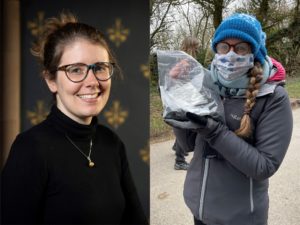On the evening of Sunday the 28th of February, 2021, a massive fireball was seen streaking across the sky from the UK and in North-West Europe.
This bright shooting star was captured by thousands of cameras, from telescopes to doorbells, and reported far and wide. As the SARS-CoV-2 Alpha variant surged, planetary scientists’ emotions surged too, realising the meteor was likely to have dropped the UK’s first space rock in 30 years. What became known as the ‘Winchcombe meteorite’ broke into pieces as it fell to Earth and dispersed across a 4 km2 area of the Gloucestershire Cotswolds and one lucky family (with a very lucky guinea pig who narrowly missed a fateful end) woke the next morning to find the biggest piece shattered on their driveway.
Join Áine to hear what it was like to be part of the small team sent to scour the Gloucestershire countryside for small dark objects (that weren’t poo!) during the second national lockdown, before the news could be announced to the public, and what this rock, which is older than the Earth, has already told us about the formation of the solar system.

Áine O’Brien is an Astrobiology and Planetary Science PhD student at the University of Glasgow. That’s a fancy way of saying she zaps rocks from space with lasers and X-rays. She holds a BSc in Physics with Astrophysics from the University of Leicester and a PGCE from the University of Buckingham. She also works part time for the Royal Astronomical Society as their Diversity Officer, advocating inclusive practices to make the space sector a more accessible field and welcome to all. Alongside her work she is a big fan of penguins, the Scottish hills, and inviting herself to look after her friends’ pets.
https://www.highgateschool.org.uk/book-hire/events/ to book your free place online.